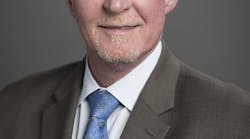Having served as director of both the Central Intelligence Agency and the National Security Agency, retired Air Force Gen. Michael Hayden has a deep understanding of the wide range of threats facing our nation today, whether it is from terrorist groups, such as al-Qaida and ISIS, or rogue nation states like North Korea and Iran. However, Hayden, who delivered the keynote address last Wednesday at ASIS 2015 in Anaheim, Calif., said that in all of his years being part of the intelligence community, he has never seen the security landscape as dynamic and fast-changing as it is today.
“We have seen it more dangerous, but we have not seen it this complicated,” Hayden told attendees.
While past events like the Cuban Missile Crisis have put the country on the brink of nuclear disaster, Hayden said changing power structures throughout the world present an entirely new risk paradigm. Whereas during the industrial age power was consolidated within the center of a country and wielded by political elites, Hayden said the post-industrial age is the exact opposite with individuals, groups and gangs being more empowered, which means there are a greater number of people with the ability to inflict harm on us. At the same time that power has been pushed down to more people, the world has also become more interconnected which, according to Hayden, means that the impact of an event has become more immediate.
As such, Hayden believes that that greatest threats facing the country will not come from a malevolent nation state but rather from the byproduct of a weak or failed nation state. He specifically pointed to war-torn places, such as Iraq and Syria, where Islamic radicals have stepped in to fill the power vacuum created by the collapse of totalitarian regimes.
“Iraq is not coming back. Syria is not going to be reconstructed,” said Hayden.
Hayden also told attendees that the likelihood of another 9/11 occurring is virtually nil as he said the government is now "really good" at preventing attacks of these nature that involve many different individuals and have a lot of moving parts to them. On the other hand, he said that so-called lone wolf attacks, such as the shooting massacre at Charlie Hebdo earlier this year, are much more difficult to prevent and are something that authorities will have to deal with for the foreseeable future.
Cybersecurity
Like most people within the law enforcement and intelligence community, Hayden sees cybersecurity as being one of the most important national security issues of the day.
“This was a domain built for speed and convenience, not security,” Hayden said of the internet.
However, he’s not only concerned about hackers breaking into systems and stealing personal information. The greater cybersecurity threat, according to Hayden, is the potential of someone breaking into computer systems and changing information rather than taking it. For example, he said to think of the irreparable damage a hacker could have on the trust we place in the U.S. banking system if they were to focus on switching account numbers around as opposed to just adding zeros behind their own.
Then, of course, there is the danger posed by viruses and malware created solely to destroy critical infrastructure systems such as Stuxnet, which severely hampered Iran’s nuclear program by causing centrifuges to tear themselves apart.
While there are many hacktivist groups, criminal organizations and individuals capable of inflicting damage, Hayden said that it is nation states that have the greatest capability to carry out large-scale cyber-attacks. He said the greatest of these threats come from small- to mid-sized nation states, such as Iran and North Korea.
Despite the fact that China has been singled out as one of the biggest perpetrators of cyber espionage, Hayden said that they are not an enemy of the U.S.
“I’m not worried about the Chinese turning the lights off on the East Coast,” said Hayden.
In fact, Hayden said that some people within the intelligence community actually spend a little time worrying about Chinese weakness. He added that managing our relationship with China will be one of the primary goals of U.S. national security over the next two to three decades.


